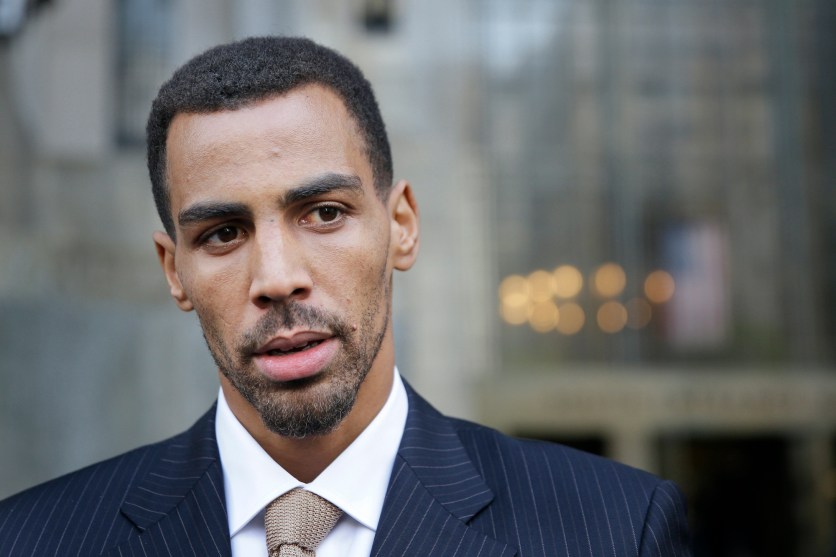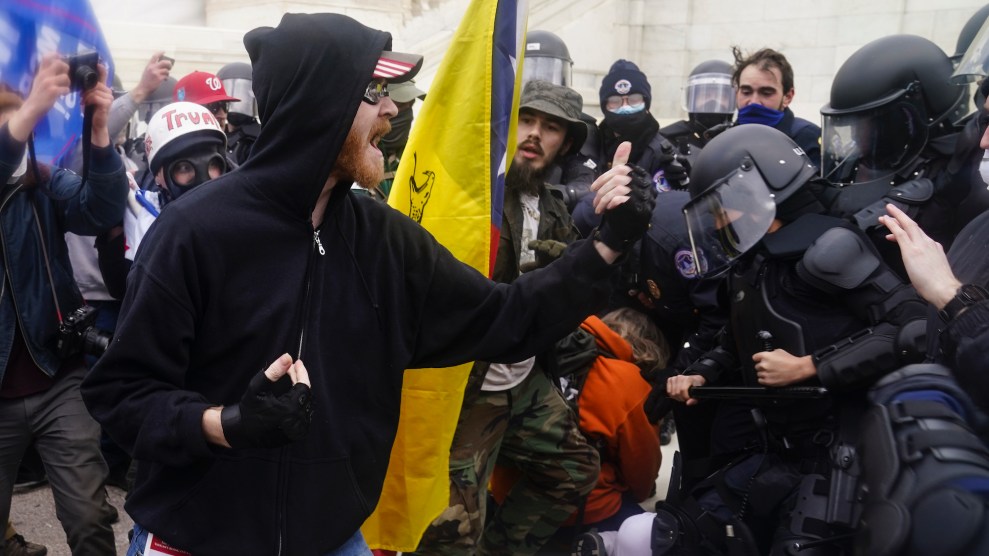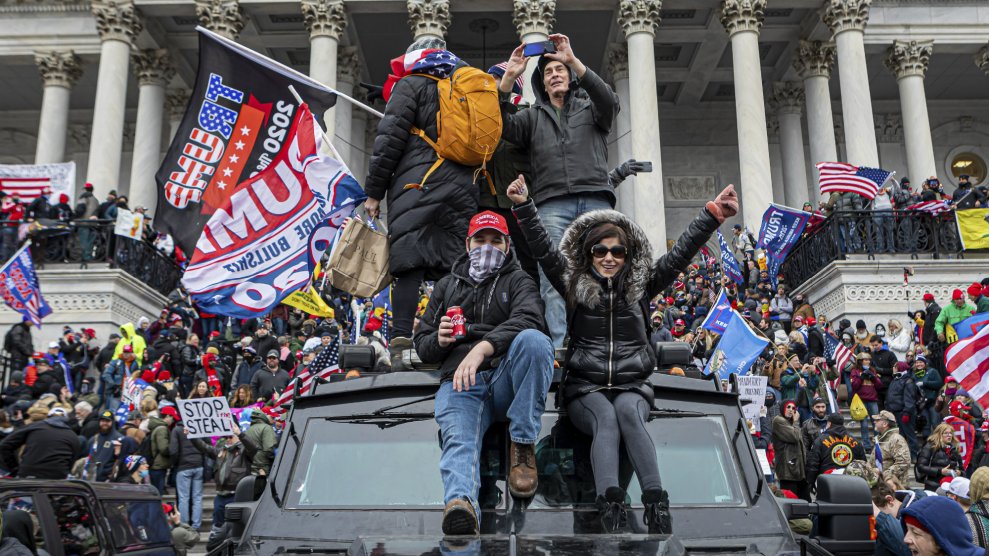
Thabo Sefolosha talks to reporters outside criminal court in New York.Seth Wenig/AP
This story was published originally by ProPublica, a nonprofit newsroom that investigates abuses of power. Sign up for ProPublica’s Big Story newsletter to receive stories like this one in your inbox as soon as they are published.
Five years ago, NBA guard Thabo Sefolosha was standing outside a nightclub when he was tackled by five New York Police Department officers, one of whom broke his leg with a baton.
Sefolosha sued, and the city paid its largest settlement for alleged police brutality in years, $4.5 million. After all, Sefolosha had to have surgery and couldn’t play basketball for a year. And a jury had acquitted Sefolosha of the charges against him for allegedly resisting arrest. The whole incident had been caught on tape.
But the payout—which didn’t cost the officers a dime—is where any accountability ended. The city had insisted during the case that the officers were blameless, and they ended up facing no significant punishment.
It’s left Sefolosha frustrated. “To get a settlement was a small victory. But big picture, it’s a small drop,” Sefolosha told ProPublica from his home in Vevey, Switzerland. “When are people going to be held accountable? You have to have repercussions. They’re going to do it over and over again.”
New York City has paid more than $1 billion over the past five years to settle lawsuits against the NYPD, according to data released by the city. ProPublica examined dozens of the biggest payouts in cases where civilians had also filed complaints with the city agency that reviews alleged police abuse. Again and again, the officers faced minimal or no discipline.
In one case, the city paid out $125,000 when officers allegedly fractured someone’s cheekbone with a flashlight. The officers were not disciplined. In another case, officers allegedly bashed in a man’s car window with a baton, then broke his ankle dragging him from the vehicle and charged him with resisting arrest. The charges were dropped and the city paid $460,000 to settle. The officers again faced no discipline.
In the 45 cases we examined, the harshest penalty any officer received was a loss of 15 vacation days—for punching a teenager and knocking him unconscious in an incident caught on tape that went viral. The city settled that case for $200,000.
The city has ended up paying out settlements for some officers’ alleged misconduct again and again. Over the past seven years, at least 800 officers have been named as defendants in five or more suits settled by the city. About 50 have been named in at least a dozen settlements.
The city has paid out more than $600,000 in settlements for one officer, nicknamed Bullethead, who has been sued dozens of times. The money in all these cases comes not from the officers or the NYPD itself, but from the city taxpayers.
A report a few years ago by the New York City Bar put the issue succinctly: The city’s civil claim system is “failing in one of its principal purposes, to shape the actions of those officials on whose behalf damages are paid.”
While the Office of the New York City Comptroller—which cuts the settlement checks—tracks details of cases, the NYPD only recently agreed after a court order to incorporate some of the information into its monitoring of officers’ conduct.
Under Mayor Bill de Blasio, the city has moved to limit payouts on what the mayor described early in his administration as “frivolous lawsuits” against the NYPD. While the city has kept settling cases at roughly the same pace it has for years, it has become more aggressive in its defense of the NYPD. In a few cases reviewed by ProPublica, the city has defended officers who seem to have lied or engaged in what was clearly misconduct.
Joe Berger, a New York City civil rights attorney who previously worked at the Law Department, told ProPublica that the Law Department “will say anything, no matter how ridiculous, to defend officers.”
Berger, who brought a recent case against the city in which he said an officer lied to arrest his client, wrote in a law review article last year that police misconduct victims are “mistreated twice these days, first by the misconduct itself and then by city attorneys who withhold or acquiesce in the destruction of vital discovery and abuse legitimate plaintiffs with unethical tactics.”
De Blasio’s office did not respond to multiple requests to comment for this story.
A spokesperson for the Law Department, which handles suits, told ProPublica that each case has a “unique fact pattern and is evaluated on its individual merits.” The spokesperson emphasized that settlements are “not an admission of wrongdoing on the part of the city or its police officers.”
The NYPD said in a statement that the department “carefully analyzes allegations in civil lawsuits and the corresponding evidence to assess the merits of cases.”
The department also told ProPublica that the number of lawsuits against the police and settlement payouts have “drastically decreased.” (Read its full statement.)
According to a city report, the number of claims filed against the NYPD declined by about 10% in 2019. Payouts have also dropped modestly, from $237 million in 2018 to $220 million a year later.
In Sefolosha’s case, a spokesman for the Law Department told reporters after the case was settled that it was “not a concession that Mr. Sefolosha was blameless.” As happens with most NYPD cases, the settlement stipulated that neither side admitted wrongdoing.
An officer had told Sefolosha and his friends to “get the fuck out of the street” after they were clearing out a nightclub where there had been a stabbing. Sefolosha and the officer had gone back and forth a few times. Sefolosha, who is 6 feet, 7 inches tall, called the cop a “midget.” Suddenly, as video later showed, officers wrestled Sefolosha to the ground and the officer he had been arguing with slammed a baton down on Sefolosha’s leg.
New York City’s civilian oversight board found the officer who struck Sefolosha, Johnpaul Giacona, guilty of abuse of authority. But the board and the NYPD declined to file disciplinary charges against him and instead left any penalties to the discretion of his commanding officer. Giacona did not respond to a request to comment.
The police are “just too comfortable,” Sefolosha told ProPublica. “They’re just untouchable.”
Almost 30 years ago, the city comptroller at the time, Elizabeth Holtzman, issued a report urging the city and the NYPD to use lawsuits to identify and handle problematic officers and trends.
Holtzman, a former member of Congress and Brooklyn district attorney, left the office soon after the report came out to run for the U.S. Senate. Asked recently whether her recommendations were taken to heart, Holtzman said, “I’ve never really been able to find an answer to that.”
“To me, we wouldn’t be where we are if people had followed through. It’s a shame,” she added.
The year Holzman sounded the alarm, she noted the city paid out $44 million over the preceding five years to settle cases of alleged police misconduct.
The amount the city was paying out kept climbing, and it caught de Blasio’s attention soon after he took office seven years ago. In 2015, the city paid $5,000 to a man shot by police while he wielded a machete against the officers. De Blasio called it “wrong” and vowed to fight such cases. At a press conference, he said this was “some ambulance-chasing lawyers trying to make a lot of money.”
The same day, one of the mayor’s top deputies sent a letter to the police unions echoing that. He wrote that the administration would not “coddle these ambulance-chasing lawyers anymore.” The mayor’s office at the time was trying to repair its relationship with the NYPD’s rank and file, many of whom had turned their back to him at the funeral of an officer who had been murdered.
That year, the NYPD also began to work more closely with the city’s Law Department. It created the Police Action Litigation Section, or PALS, a unit of about 40 lawyers and investigators to assist the Law Department in cases against the NYPD. The architect of PALS was Larry Byrne, the NYPD’s longtime legal czar and a fierce defender of the department.
Byrne told ProPublica before his recent death that the unit has been successful in its goal to “weed out” lawsuits without merit. Byrne dismissed the idea that settlements can be useful in identifying problematic officers. “My belief is the settlement means nothing,” he said. Settlements often happen when the city decides lawsuits are not worth fighting and “not because the officer did anything wrong.”
But at times, the Law Department’s ferocious approach to defending the NYPD has drawn criticism from judges handling the cases. In one case, a federal judge in Manhattan admonished the NYPD for not having turned over evidence in a case where a man died after being tackled by police outside Yankee Stadium.
The city’s lawyers had long claimed that there were no recorded radio calls from the incident. When the judge insisted the head of the NYPD’s legal bureau sign an affidavit attesting to that, the calls suddenly turned up.
It was a “distressing situation,” said Judge Kevin Castel at a hearing in the case, that it is only when an official “has to put their name on a declaration and under penalty of perjury—and if they are lying, they can go to jail and lose their job—that we get accurate information.”
Castel added that he wondered “whether there aren’t a ton more cases” like this.
Another case began in 2016, when a financial adviser named Darrell Williams, stepped off the subway to meet a client in Harlem. A plainclothes NYPD officer stopped him and accused Williams of trying to pickpocket a fellow passenger.
Williams, then 57 years old, had no idea what the officer was talking about. Nor did the passenger who the officer insisted was the victim, Anthony Osei.
Osei told the officer nothing happened to him, he recalled to ProPublica. He told the officer that Williams was nowhere near him on the train.
The officer, Xavier Gonzalez, still arrested Williams, who spent the next 17 hours in jail. Gonzalez did not respond to a request to comment.
A couple days later, Osei received a call from someone with the city about the incident. (He doesn’t recall exactly who.) “I said: ‘It’s not true. Why the police officer arresting the guy? You have no evidence,’” Osei told ProPublica. He said he called the person back a few days later to make sure his message was clear.
After a few months, the Manhattan district attorney dropped the charges. Williams sued the city and was represented by Berger, the former Law Department attorney.
During the litigation, Osei once again told his story that he hadn’t been robbed of anything. Williams recalls meeting Osei when he came to an office to give his deposition. “When we looked at each other, he said I never saw him and he never saw me,” Williams said, chuckling.
In 2019, the Daily News reported that Gonzalez admitted during his deposition that he never spoke to Osei on the subway platform that night despite indicating that he did in his criminal complaint. That same year, the city settled the lawsuit with Williams and paid him $100,000.
As part of the settlement, the officers admitted no wrongdoing. Gonzalez has not faced discipline and has since been promoted to detective.
But Williams has paid a price. His license as a financial adviser was suspended. “Once I told them, I got suspended for like four months until the case was over,” Williams said. “The level of devastation, you’re not allowed to go to your office, have contact with clients.”
Like Sefolosha, Williams is upset that the officer himself has faced no consequences. “I went through all that, nothing was done on his side,” Williams said. “The only thing that happened on his side was he had to come to some depositions.”
In another case, the city pushed to clear an officer after a jury found him liable for killing a civilian.
Twenty-five-year-old Mohamed Bah had been shot by officers in 2012 after his mother called 911 when he was acting strangely. Bah had been shot multiple times after, officers said, he lunged at them with a knife. The final shot, which killed Bah, had struck him in the head while he was pinned on the floor.
A jury awarded Bah’s family $2.2 million, but the case dragged on for more than a year as the city appealed. It also pushed for the removal of the jury’s finding of liability for the NYPD officer who fired the last shot.
In March 2018, Castel—the same judge who admonished the city for delays in turning over evidence in another case—rejected the city’s argument. In his order, Castel wrote that if the officer’s liability were cleared, then that “undoes the work of the jury.”
Bah’s lawyer, civil rights attorney Debra Cohen, called the attempt “a cynical perversion of justice.”
The question was never whether the officer would have to pay the judgment on his own—the city almost always pays for them. Clearing the jury’s liability would have simply kept the finding off the officer’s public record.
Meanwhile, an NYPD review of the case ended in no punishment for the shooting itself. The only officer disciplined over the incident was a lieutenant who the department concluded had failed to properly supervise the investigation. The officer received a letter telling him to review department policy.
Bah’s mother, Hawa Bah, said she believes the officers that killed her son “feel no consequences.” She said they should have been fired and their pensions taken away. “That will stop them killing us.”
The NYPD’s most-sued officer is Brooklyn Sgt. David Grieco, aka Bullethead. In one lawsuit he’s currently facing, a Brooklyn woman said a squad led by Grieco essentially held her hostage in her apartment for about 16 hours.
In October 2017, police showed up at Rolinda Walls’ Brownsville apartment looking to speak with her daughter about an investigation. Her daughter was not home. So they waited, staying all night in her apartment. Walls recalled having to ask officers for permission to go to the bathroom. (Grieco did not respond to a request to comment.)
Walls hired attorney Rose Weber, another civil rights lawyer who used to work at the city’s Law Department. Three years into the case, the two sides found themselves battling over disclosure of Grieco’s and the other officers’ disciplinary records.
The city turned over some of the files under a protective order but redacted information it said was irrelevant to the case. Weber asked the court to order the city to turn over the full records.
Last month, Judge Vera Scanlon ruled in Walls’ favor but ordered that records remain under seal. Meanwhile, in the past few months, Grieco has been named as a defendant in at least two more lawsuits.
Derek Willis contributed reporting.







